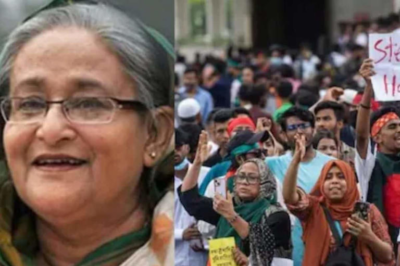
News Summary:
- Sajeeb Wazed Joy, son of former Prime Minister Sheikh Hasina, accuses Pakistan’s ISI of fueling unrest in Bangladesh.
- Sheikh Hasina fled to India after violent protests, and Joy insists she will return once democracy is restored.
- Joy expressed gratitude to India for protecting his mother and called for international pressure to restore democracy in Bangladesh.
Is Pakistan’s ISI Really Behind Bangladesh’s Political Turmoil?
In a tense political climate, Sajeeb Wazed Joy, son of ousted Bangladeshi Prime Minister Sheikh Hasina, has pointed fingers at Pakistan’s intelligence agency, ISI, for stirring unrest in the country. Joy, in a recent interview, accused the ISI of orchestrating the violent protests that led to his mother’s departure from Bangladesh. The protests erupted over a controversial quota system in jobs, resulting in widespread chaos and bloodshed across the nation. With over 469 deaths reported, the situation in Bangladesh has become increasingly dire, raising concerns both locally and internationally.
Joy emphasized that despite his mother’s departure, the Sheikh Mujib family would not abandon the people or the Awami League, Bangladesh’s oldest political party. He also highlighted the need for India, an “all-weather ally,” to lead efforts in building international pressure to restore democracy in Bangladesh. Joy’s accusations against ISI suggest a larger geopolitical struggle, with Pakistan allegedly attempting to destabilize Bangladesh.
What’s Next for Sheikh Hasina and Bangladesh?
Joy’s remarks come at a critical time when Bangladesh is teetering on the edge of chaos. His statements indicate that Sheikh Hasina is determined to return to her country once stability is restored, though it remains uncertain whether she will re-enter politics or retire. The family’s decision to prioritize the safety of the nation over their political future underscores the gravity of the situation.
Meanwhile, Joy’s call for India to intervene reflects the deep-rooted ties between the two nations. He urged India to take swift action to prevent anti-India forces, allegedly supported by ISI, from gaining ground in Bangladesh. His appeal also highlights the delicate balance of power in South Asia, where Bangladesh’s political stability has significant implications for regional security.
As the situation continues to unfold, the world watches closely to see how the interim government, led by Nobel laureate Mohammad Yunus, will handle the growing unrest. The return of democracy, according to Joy, is essential not only for Bangladesh but also for maintaining stability in the region.
In conclusion, Sajeeb Wazed Joy’s accusations against Pakistan’s ISI and his appeal for India’s support underscore the complexities of Bangladesh’s current political crisis. As Sheikh Hasina waits in India, the future of Bangladesh hangs in the balance, with the restoration of democracy being the key to resolving the ongoing unrest. The coming days will be crucial in determining whether Bangladesh can overcome its challenges and move towards a more stable and democratic future.









































Leave a Reply